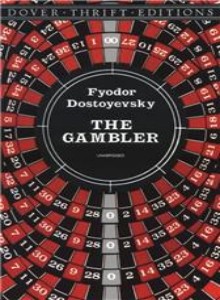Dostoevsky: A Compulsive Gambler
Dostoevsky recorded his struggles with Gambling Addiction in the 1800’s, yet the American Psychiatric Association did not recognize this addiction until 1980.
Today The American Psychiatic Association recognizes the disease of
Disordered Gambling as a treatable mental health disorder.
Fyodor Dostoevsky famously wrote “The Gambler” , published in 1867. Obviously not a work of complete fiction, Dostoevsky notably had first-hand experience as a gambling addict.
In a letter to his beloved Anya, Dostoevsky asks her to
“Remember too that I’m not a scoundrel, just a passionate gambler.”
Certainly one can surmise that with the expanded availability of gambling (now legal in 48 states), the incidence of problem or “disordered gambling” is likely to have increased commensurately. It has been well-documented that gambling has been around since ancient times. It would also seem, based on Dostoevsky’s letter to his wife, that gambling addiction has existed through the ages.
Get a glimpse of the mind of a compulsive gambler in Dostoevsky’s letter to Ayna Dostoevsky_Letter



KENNETH GAUGHRANJuly 16, 2013 at 2:22 pm
As a recovering compulsive gambler and addictions counselor and
periodic author on addiction issues, I give you tremendous credit for making light of Dostoevsky’s gambling problem. I first came
across Dostoevsky’s gambling addiction when I read either book
21 or book 22 of Sigmund Freuds complete works,entitled:
“Dostoevsky and Parricide”. Freud not only was a contemporary of
Freud,but friend and patient as well. Freud believed the reason
Dostoevsy’s gambled until he was peniless, was the result of what
he called:Dostoevsky’s “failed oedipal strivings”. In other words
Freud rationalized that(like all men)Fydor subconsciously yearned
to sleep with his mother and the only way that could happen if
he first murdered his father. Consequently Freud believed that
on a unconscous and maybe even conscious level that Dostoevsly
was consumed with guilt about this. Therefore,to relieve or extinquish his guilt he deepdown wanted to lose(and did) and upon losing all his money Fydor would feel a brief rush of feeling cleansed.
What can we take from Freud’s theory of Dostoevsky’s compulsive
gambling? Personally, I can take two important issues from Freud on gambling. Firstly,as some one who buys into Freudian
Ego Systems View: I as a gambler always had lingering feelings of guilt when I was gambling and their was never any
question that I unconsciously wanted to lose. However,I do believe
my guilt was related to familial moral issues- that were based more
on the fact: I felt gambling was going against the grain of my family’s Protestant Work Ethic and not on any strivings having to do with sex. Secondly,having said all that I strongly believe that
my 31 years of gambling could be labeled as a “sexual substitution”;the feelings I had when my horse was making a
big move on the far turn,was often better than sex-with the dopamine engorging my frontal lobes and the nitric oxide flowing
through my veins it was similiar to someone experiencing a orgasm. Strangely,enough I often felt very disconnected
and guilty after a big win and I think that was the result of policing
mechanisms in my brain judging my behavior based on earlier
ethical templates(or the old stem views) Moreover, I buy into
Freud’s guilt connection because how else do you explain: that
after I blew out(went broke after a gambling binge) I would often
feel like I experienced a epiphany
Finally, with the use of fuctional MRIs we know that sexual addiction and pathological gambling are on the same continum.
However,eleven years clean I have gotten rid of the gambling,
but I still have the guilt-strangely enough I think this is more of
a “maslowian problem of not getting enough sex”
Ken Gaughran
Kenneth GaughranJuly 17, 2013 at 9:29 am
To whom it may concern,
My blog on Dostoevsky’s gambling problem and Freud’analysis of
such is erroneous in that Freud and Dostoevsky never met. Even
though they were alive at the same time,Freud never met with him
and did “psychoanalysis by proxy” on Dostoevsky’s abundent literature in his piece in 1928,entitled:”Dostoevsky and Parricide”. Since I wrote about this in 1986,while at NYU,you can understand
the error…God bless,Ken Gaughran